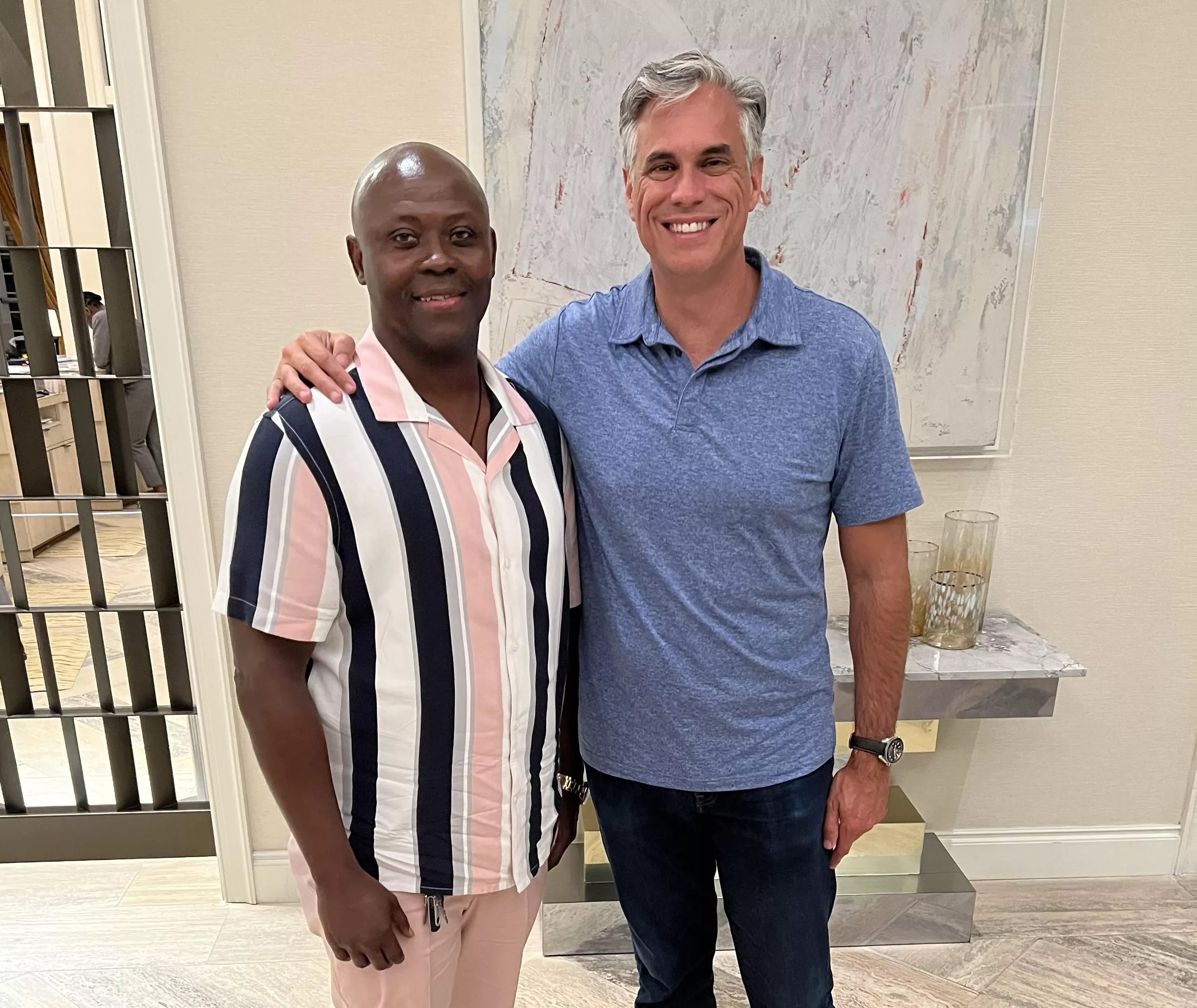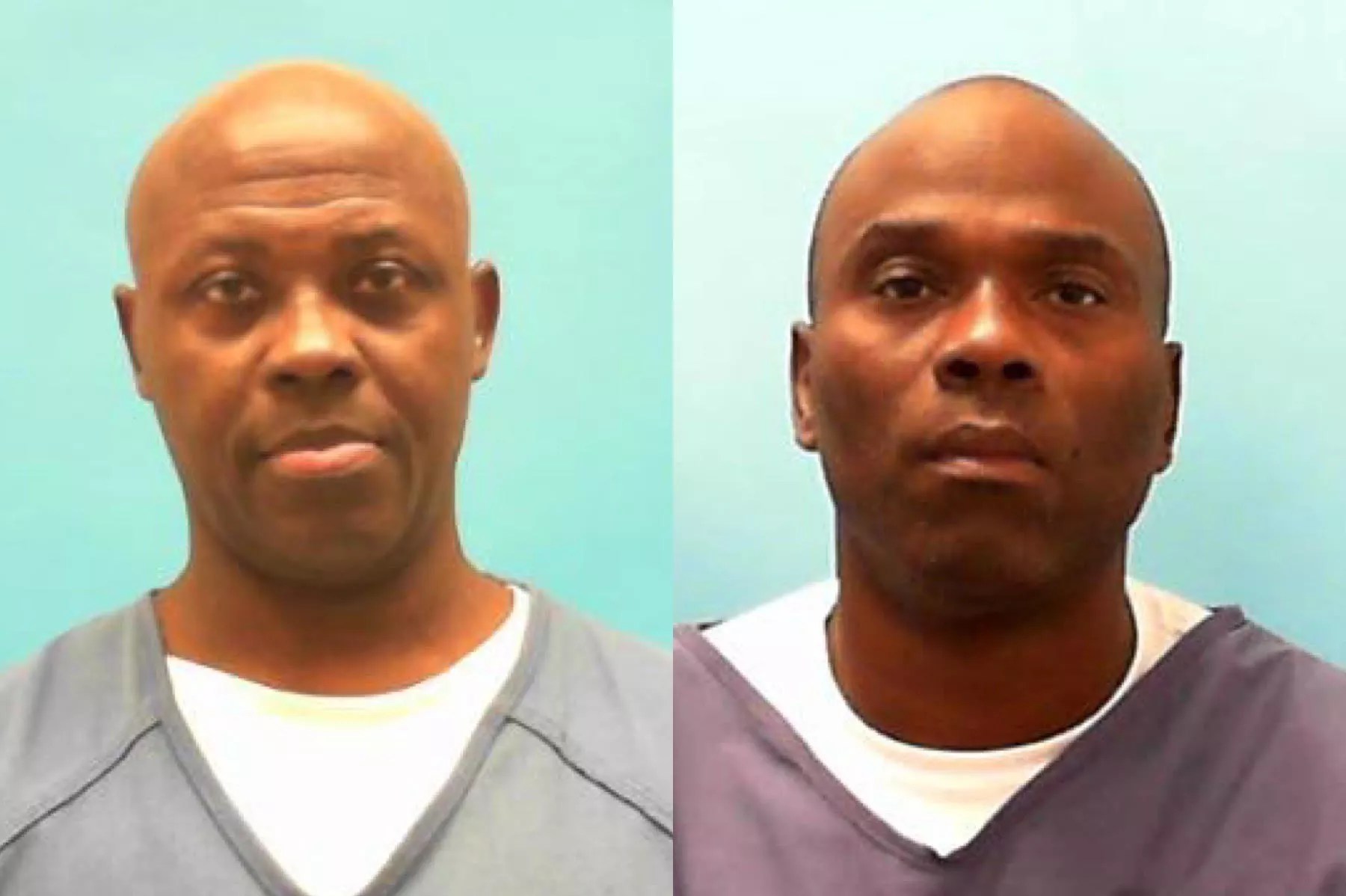
Photo by Mark Rankin

Audio By Carbonatix
A payout from the State of Florida may be on the way for Thomas “Jay” Raynard James, a Miami man who spent three decades behind bars on a wrongful conviction for the 1990 murder of Francis McKinnon.
Filed by State Sen. Darryl Rouson, a bill labeled SB 26 is seeking to compensate James $1.6 million for his time in prison stemming from the now-vacated conviction. In December, the bill was referred to a criminal justice appropriations committee and a special master on claim bills.
James, 56, walked free in April 2022 after former New Times writer Tristram Korten’s GQ investigation pinpointed shortcomings in prosecutors’ case. James’ attorney Natlie Figgers had simultaneously been conducting an 18-month probe to help prove her client’s innocence.
Figgers and Korten sent their findings to the Miami-Dade State Attorney’s Office, which agreed to take a second look at the case and later moved to abandon the conviction.
“They robbed him of his livelihood,” Korten tells New Times. “I think that we all have to acknowledge, especially within the context of criminal justice, how the scales have been weighted against poor Black men. We all have to acknowledge this and make it right by him. We all owe that to him.”
The senate bill might be James’ most viable route to compensation from the State of Florida, as his criminal history predating the murder conviction bars him from receiving money through the state’s law on compensation for wrongful incarceration.
The Florida statute provides for up to $50,000 for each year of wrongful incarceration, with a $2 million cap per inmate. But applicants must meet the eligibility requirements under the “clean hands provision” regarding past felony convictions.
James was previously convicted of felonies for possession of cannabis with intent to sell, as well as resisting law enforcement and battery in connection with an incident in which he knocked over an officer while fleeing from a raid, as Korten reported.
“I remember feeling crestfallen when I found he was ineligible to receive state compensation,” Korten says.
Attorney Mark Rankin, who is representing James in the claims bill process, tells New Times he first came across James’ story upon reading Korten’s investigation. After finding out James would not be eligible for compensation under the Florida statute, he contacted his local state representative, Senator Rouson, to see if he would file a claims bill on James’ behalf.
Rankin says he was disappointed that James’ path to compensation was being stifled by “something he did when he was a 20-year-old kid.”
“This is a different person. One or two generations have gone by in the meantime. It just seems like bad policy,” the attorney says.
If approved, SB 26 would provide for a means to compensate James outside the Florida statutory process, setting aside the $1.6 million payout for James from the state’s general revenue fund. (The payout would equate to $50,000 per year of incarceration, the same maximum sum he would receive if he applied for compensation under the statute.)
“He’s getting his life back in order, but it is hard to start over when you’re 56 years old, have no job history for the past 30 years, and you’re a felon. He deserves to have a second chance in life,” Rankin says.
In “The Tragic Case of the Wrong Thomas James,” Korten found that James ended up in prison for first-degree murder on the basis of a questionable witness identification process and an apparent case of mistaken identity. He was convicted of a robbery and killing in Coconut Grove – a place James said he had been “only once or twice in his life.”
In 1990, the Metro-Dade police (today’s Miami-Dade police) were looking for the two men who perpetrated the deadly robbery at McKinnon’s apartment. While multiple witnesses said they recognized one of the men as Vincent “Dog Williams,” one woman brought up the name “Tommy James.” Other tips came in claiming two Coconut Grove residents, Williams and a man named Thomas James, were the thieves.

Thomas Raynard James (left) and Thomas “Tommy” James.
Photos via Florida Department of Corrections
Korten recounts that a homicide detective believed he found his guy after discovering a mugshot for Thomas Raynard James, who had past drug arrests on his record and a pending gun charge. The investigators set up a photo lineup with his mugshot for eight witnesses, only two of whom chose his photo as the man they saw that night – McKinnon’s stepdaughter Dorothy Walton and Larry Miller, a mentally disabled can collector, Korten reported. (At the trial, Miller did not immediately recognize Thomas Raynard James as the man he had seen the night of the murder.)
Walton and McKinnon’s wife also told detectives they were related to Tommy James and knew his mother Mary – statements which did not align with Thomas Raynard James, whose mother’s name is Doris.
Despite muddled witness testimony and the absence of physical evidence linking Thomas Raynard James to the scene, a jury found him guilty of first-degree murder after three days of deliberations in January 1991. He was sentenced to life in prison a week later.
Although his appeals were continuously rejected, James never wavered in his innocence. It was in prison where James made a discovery that helped bolster his case for mistaken identity.
Thanks to conversations with other inmates who were from the Grove and an employee who agreed to search prison records, he learned about a Thomas James from South Miami with a mother named Mary. Thomas “Tommy” James had been sentenced to life in prison for a different robbery case.
Korten reported that he met with Thomas “Tommy” James, who told him he was the one the police were looking for back in 1990 – he was friends with Vincent “Dog” Williams and they once discussed robbing that apartment. The writer noted that Tommy ultimately was not a legitimate suspect, as he was sitting in jail on the night of the murder.
“It’s a fact it was me they was looking for, not him,” Thomas “Tommy” James reportedly told Korten. “I know it’s not him, and I feel bad for him.”
In March 2021, Korten reached out to the Miami-Dade State Attorney’s Office’s Justice Project with his findings attesting to Thomas Raynard James’ innocence. A month before publication of the GQ piece, a Miami-Dade State Attorney spokesperson informed Korten the Justice Project was actively investigating while waiting for additional materials to be supplied from James.
At that point, Figgers had been conducting her own probe, which spanned 18 months and more than 2,000 hours of research. She also shared her findings with the Miami-Dade State Attorney’s Office, including critical evidence that she said exonerated Thomas Raynard James: Dorothy Walton’s admission that she may have misidentified James from the photo lineup back in 1990.
Walton, the prosecution’s key witness from the trial, provided a sworn statement that recanted her identification of James, paving the way for his release.
While Korten agrees anyone who has been wrongfully convicted should be compensated, he contends Thomas Raynard James’ case stands out.
“[Police] just literally pulled a picture of a man named Thomas James and went with it. For the government to act with that little care and that sparks an investigation and then just ruin somebody’s life like that, there has to be consequences,” Korten says.
Meanwhile, two bills have been filed in the Florida House of Representatives and Florida Senate that would reform restrictions on wrongfully convicted defendants seeking compensation from the state.
HB 43 and SB 382 would extend the deadline to file a petition to claim compensation from 90 days to two years from the date a sentence is vacated. Moreover, they would trim back the clean hands provision so that wrongfully convicted inmates would not be categorically disqualified from the compensation program on the basis of unrelated felony convictions. (Compensation would still be barred if a prison sentence on a wrongful conviction ran concurrent with a sentence for a legitimate felony conviction.)
HB 43 made it out of the criminal justice sub-committee last week and is now headed to the appropriations committee.
Previous bills that sought to change the compensation rules have stalled and fizzled out in years past.
Rankin says he’s hopeful that the measure to secure the $1.6 million for James will move through the state legislature swiftly in the current legislative session. The measure is slated for a special master’s hearing on February 28.
“It’s like threading a needle. The session is only a couple of months long. Everybody and their brother is trying to get stuff into the committee hearings and get things done… and so it doesn’t always happen,” Rankin says. “I don’t have any reason to believe there will be pushback. The only speed bump that I fear is a matter of timing and getting it onto the floor to get voted on.”
Korten has stayed in touch with James since the pair first met in 2020. He tells New Times the 56-year-old is currently working for Miami-Dade County.
“He’s just taking care of business and getting the job done to get health insurance, to take care of his mom who is elderly, [and] be independent,” Korten says. “I really hope something like this comes through.”